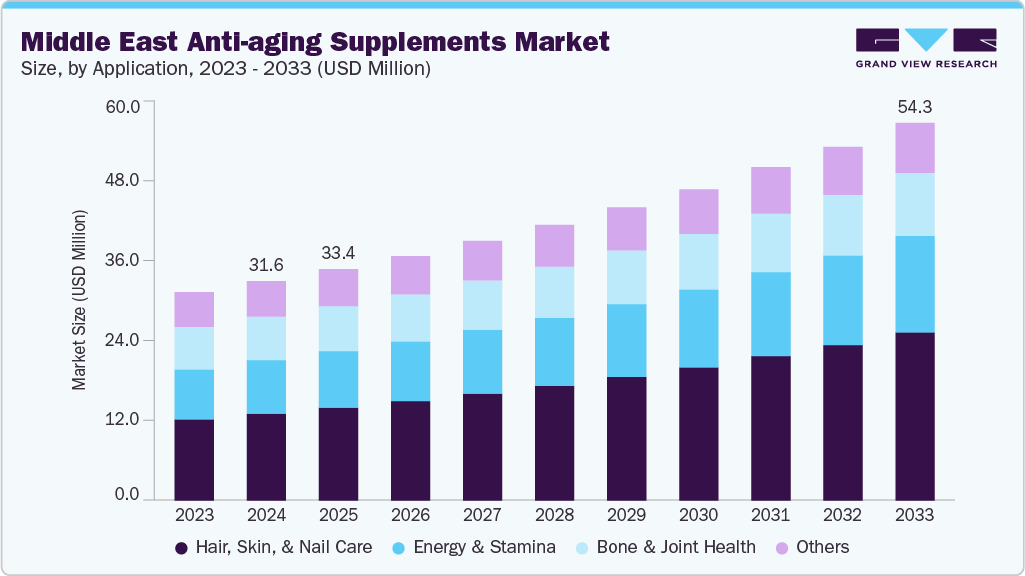Middle East Anti-Aging Supplements Market Overview
The Middle East anti-aging supplements market is poised for significant growth, projected to escalate from USD 31.6 million in 2024 to USD 54.3 million by 2033, at a CAGR of 6.29% during the period from 2025 to 2033. This promising growth trajectory is fueled by:
- Increasing health and beauty consciousness
- Rising disposable incomes
- Shift towards preventive wellness solutions
Moreover, the expansion of retail and e-commerce networks, especially in Saudi Arabia and the UAE, is accelerating market adoption. Government initiatives promoting healthy lifestyles and nutrition further bolster this upward trend.
Health and Beauty Awareness on the Rise
The burgeoning awareness surrounding health and beauty significantly influences market growth. Consumers are increasingly prioritizing:
- Preventive health
- Holistic wellness
Key Dynamics:
- Younger demographics are increasingly adopting anti-aging products to counteract visible aging signs.
- Older consumers are seeking supplements that enhance vitality, mobility, and overall health.
Influence of Digital Trends:
The impact of global beauty trends, amplified through social media and celebrity endorsements, is reshaping consumer perceptions. With rising purchasing power in the UAE, Saudi Arabia, and Qatar, consumers are willing to invest in premium products like:
- Collagen
- NMN (Nicotinamide Mononucleotide)
- Antioxidant-based supplements
Accessibility of Products
Elevated accessibility through pharmacies, beauty retail chains, and rapidly growing e-commerce platforms has made international brands more available than ever. Digital health platforms are also playing a crucial role in educating consumers, pushing the adoption rates higher.
Retail and E-commerce Expansion
The expansion of both retail and e-commerce channels serves as a linchpin for market growth.
Trusted Channels:
- Pharmacies and supermarkets remain critical offline channels, providing established credibility and fostering direct consumer engagement.
- Both platforms build trust, especially in regions with heavy regulations.
Digital Growth:
- E-commerce channels accelerate market expansion by enhancing accessibility and consumer education.
- Young, tech-savvy consumers are drawn to online convenience, wider product choices, and opportunities for comparison shopping.
Market Characteristics and Competition
The Middle East anti-aging supplements market features moderate innovation.
Innovative Products:
- New formulations, including collagen blends and plant-based actives, are entering the market.
- A growing demand for personalized nutrition solutions caters to evolving consumer preferences.
Market Fragmentation:
- M&A activities are low, with brands focusing on organic growth strategies rather than acquisitions.
- Global players prefer direct distribution and partnerships due to the fragmented landscape.
Regulatory Influence:
The market is subject to varying regulations, affecting product launch timelines and compliance costs but ultimately fostering consumer trust.
Ingredient and Application Insights
Dominant Ingredients
- Collagen accounted for 28.54% of the market in 2024. Its benefits include improved skin elasticity and joint health.
- The NMN segment is expected to grow at the fastest rate, fueled by interest in cellular health and longevity.
Popular Applications
The hair, skin, and nail care segment led with a 39.52% revenue share in 2024. This segment is expected to witness the fastest growth driven by increased demand for:
- Beauty-from-within solutions
- Holistic wellness products
Formulation Trends
The capsules segment dominated with 34.15% in 2024, favored for convenience and precise dosing. The powder segment, however, is projected to grow at a CAGR of 7.71%, supported by the demand for customizable formats.
Distribution Channel Insights
Offline Channels
Offline segments remain predominant due to:
- Consumer reliance on pharmacies and supermarkets for trustworthy products
- Having established networks enhances product visibility and sales
Online Channels
The online segment is set to experience a growth rate of 6.89%, driven by increasing comfort with e-commerce platforms, subscription models, and digital promotions.
Country-Specific Trends
- UAE: A leader in the market due to purchasing power and premium product demand.
- Kuwait: Witnessing gradual growth, with increasing awareness and accessibility.
Key Companies in the Market
Notable players shaping the landscape include:
- Thorne
- GNC Holdings
- Life Extension
- Nu Skin Enterprises
These established companies enjoy robust recognition, bolstered by trust in international health standards.
Emerging Brands
Local companies are entering the market by offering affordable alternatives, leveraging strong marketing strategies, and appealing to health-conscious consumers.
Recent Developments
- In September 2022, H&H Group launched Swisse in the UAE, marking its entry into the Middle East.
- January 2025 saw GE Services & Trading launch several innovative wellness products at Arab Health 2025.
Conclusion
The Middle East anti-aging supplements market is primed for growth, driven by rising health consciousness, evolving consumer preferences, and a robust retail and e-commerce presence. Companies that balance innovation, quality, and accessibility will be well-positioned to capture a larger market share in this dynamic landscape.
For further insights, explore more about the trends and opportunities in the anti-aging supplements market.


